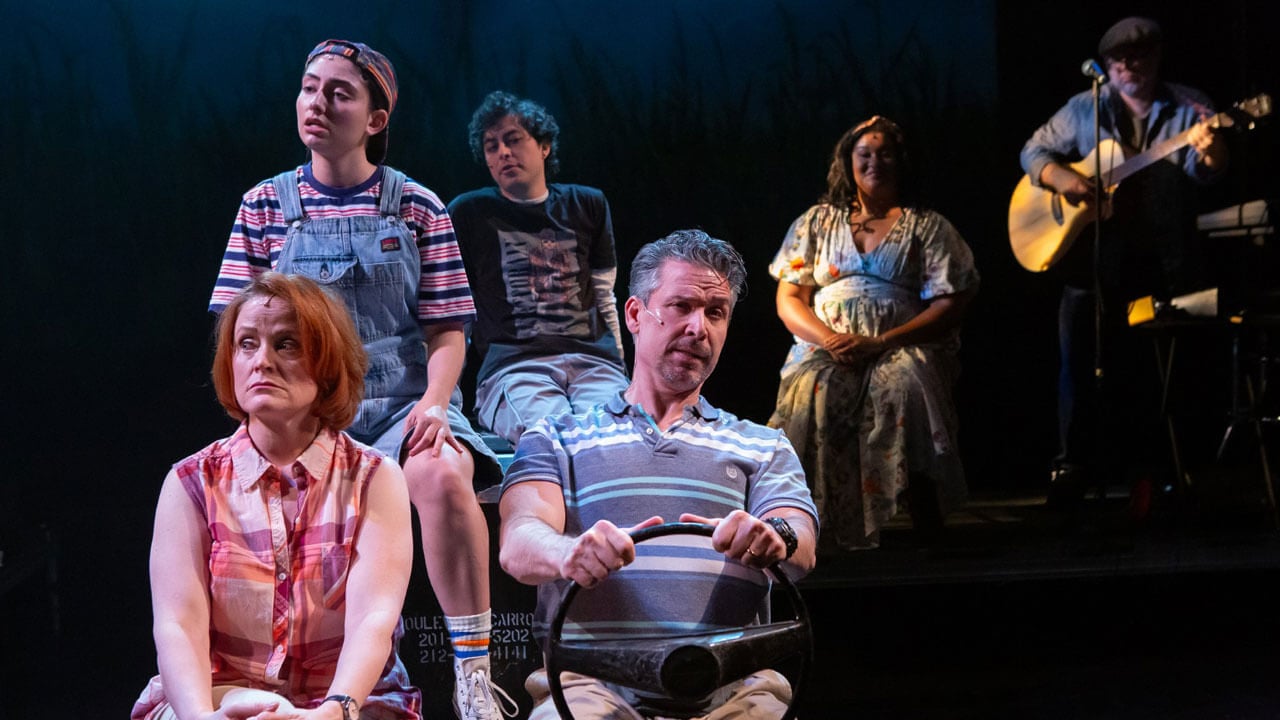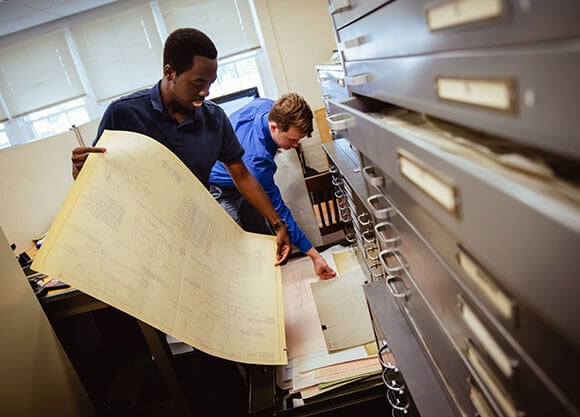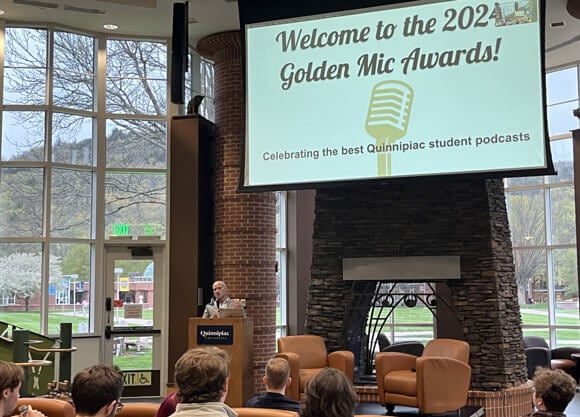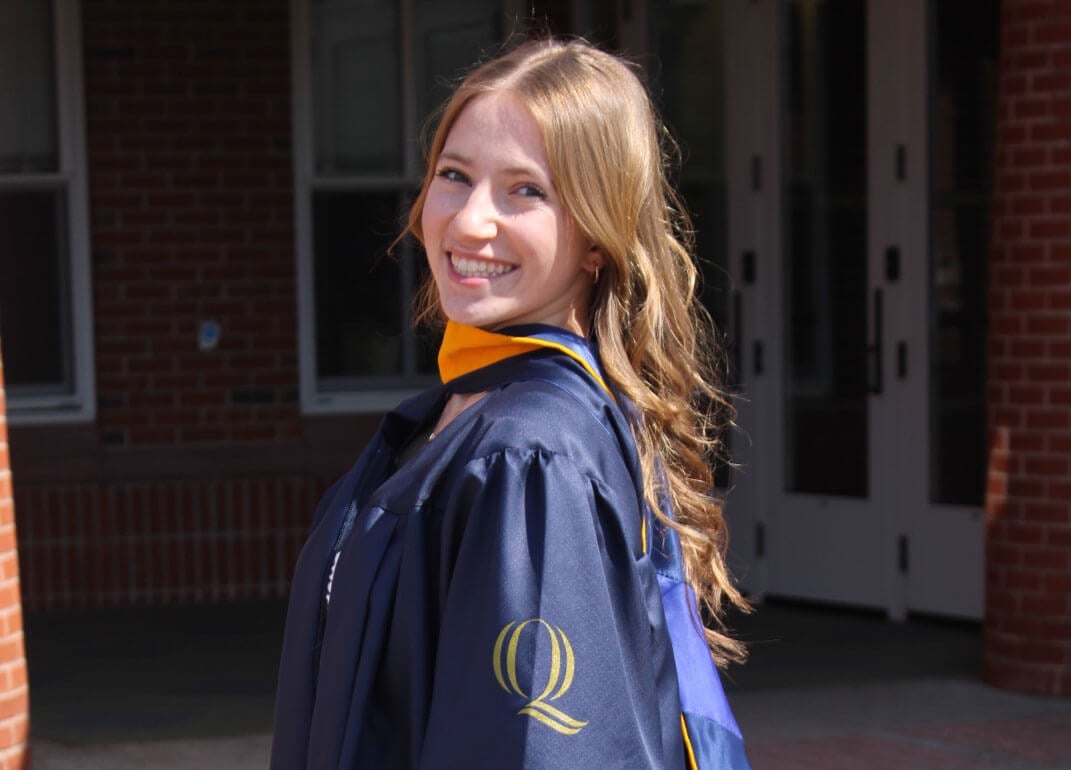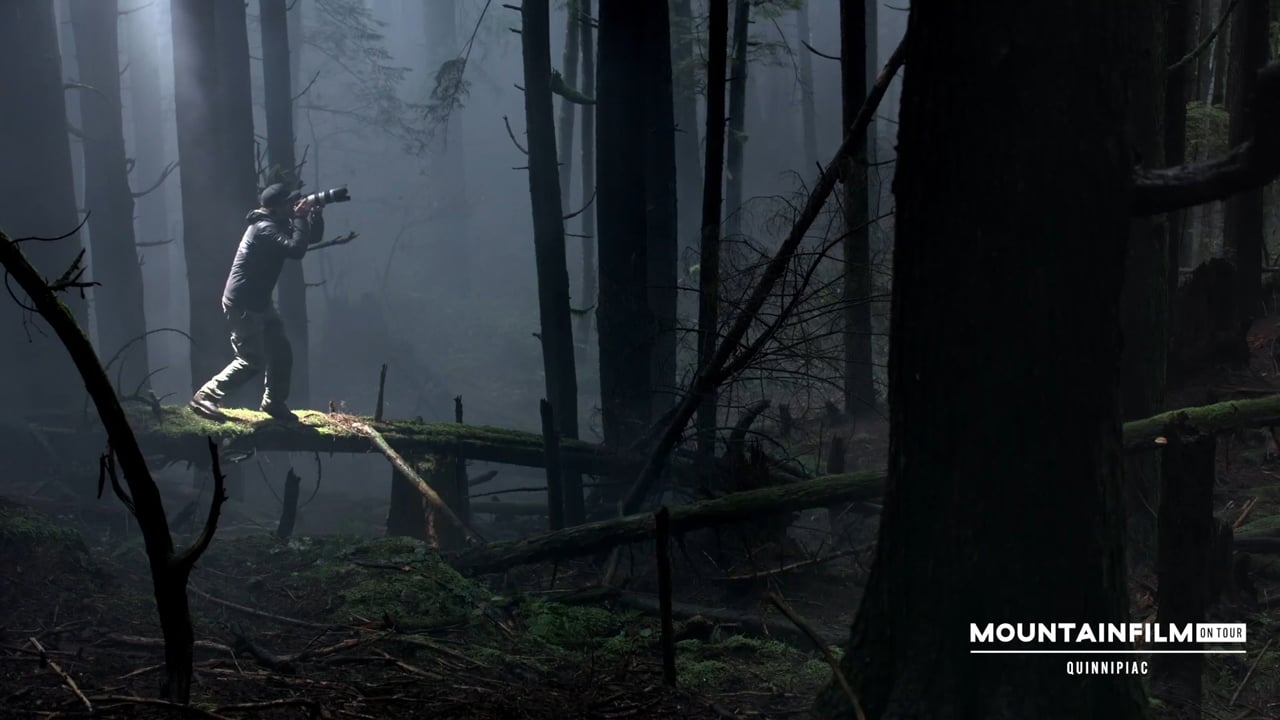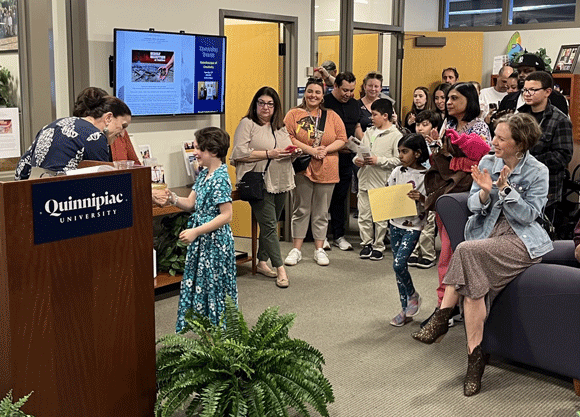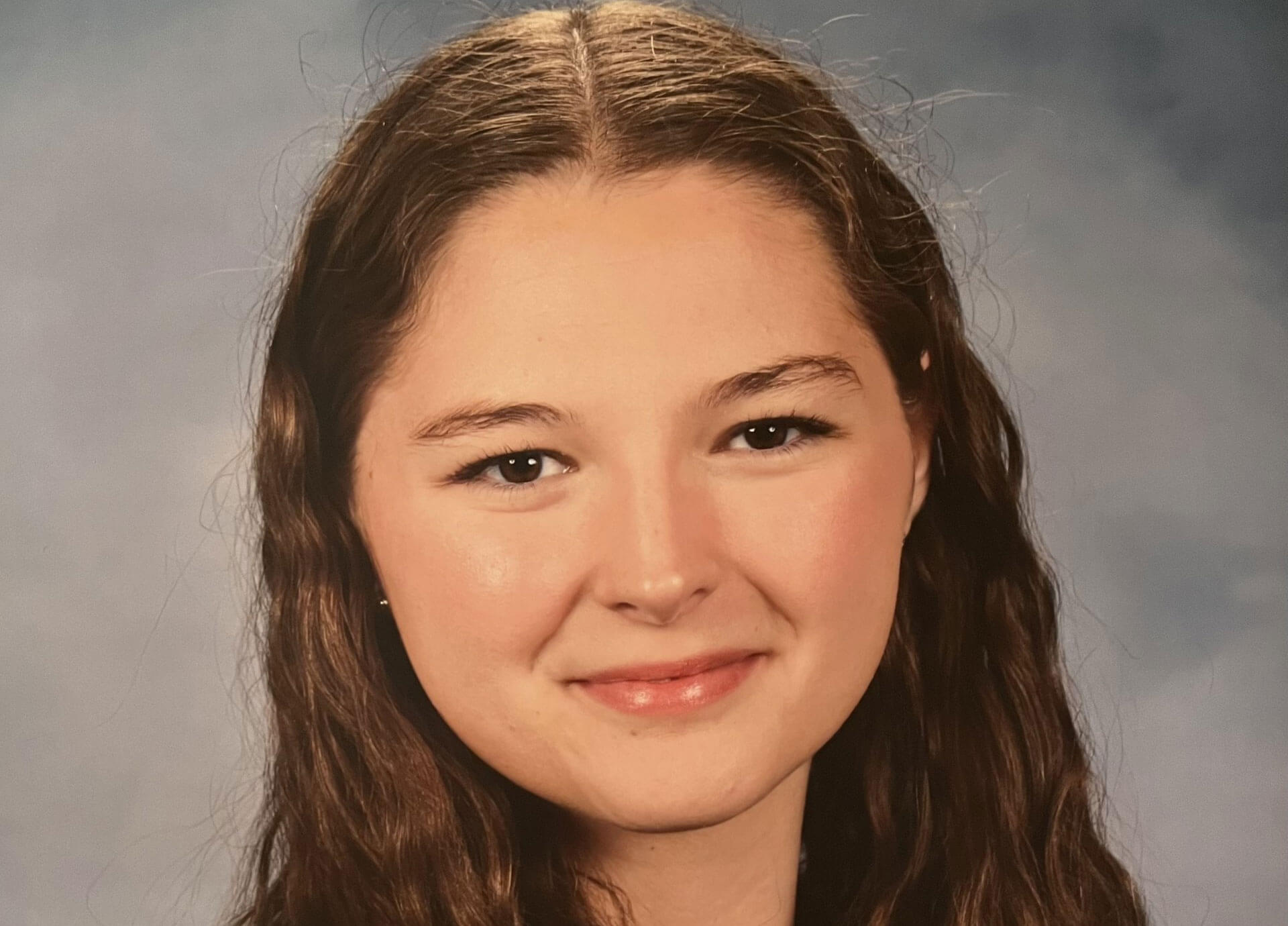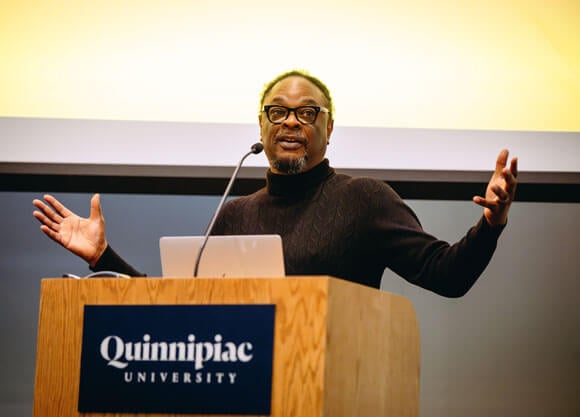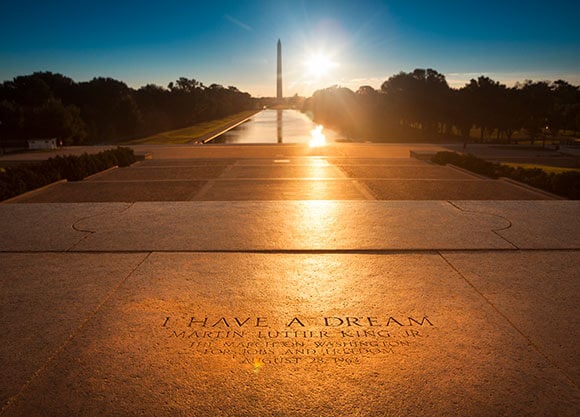
The musical tapestry of sound, tempo and instrumentation produced by Quinnipiac sociology professor Grace Yukich and School of Education assistant teaching professor Jennifer Dauphinais helps this play tell the story of a family balancing its challenges as they undertake a road trip on the legendary highway.
Yukich and Dauphinais adapted modern interpretations of 10 historic songs drawn from Carl Sandburg’s “American Songbag,” an eclectic 1920s anthology of American folk songs. The two also helped to hand-pick the players in the live ensemble band which remains on stage during the play.
Yukich and Dauphinais knew one another through their independent successful journeys as songwriters and performers. Yukich majored in theater as an undergraduate, when she also first she befriended Sarah Norris, the director of “The Greatest Hits Down Route 66.” The show is produced by Norris’s non-profit New Light Theatre Project.
When Norris reached out to Yukich with the opportunity to arrange the play’s music, Yukich knew it was a perfect opportunity to team up with Dauphinais.
“Both of us had a lot of experience in our different realms of writing music and writing lyrics and producing music,” said Yukich. “But this was the first time we had the opportunity to do this kind of project, where we were arranging music for a play that would be performed by an ensemble cast and by musicians on stage. So that part was really new for us and really exciting.”
Dauphinais likened the speed of their learning curve to the adjustment many first-year university students may feel.
“In a pedagogical way, it’s sort of like when a freshman comes to college and they have to access the discourse of the academy and you’re in the weeds with it, trying to understand and interpret a new world,” said Dauphinais.
Dusting off music from a historical archive brought with it the challenge of listening with a close ear to the anthology’s presentation of regional cultures from across the U.S. In some cases, the songs were appropriated without crediting the origin communities, including communities of color. Dauphinais said the play’s narrative and the research undertaken to help define its music in the process of arranging it, helps to contextualize this missed history.
“There are a lot of layers to this play. There is the narrative of this family, but there’s also that narrative of what the Songbag is about and this history that it highlights, for better or for worse,” said Dauphinais. “Some of these songs were taken without credit of what they were for, or who they were for.”
Yukich sees sociological implications in the way the play asks questions about American culture and the role of music in shaping who we are as a nation.
“The play itself digs a good bit into the idea of whose stories get told and whose stories get left out of American history, particularly the story of American folk music. Whose music is ‘American’? Whose music gets shared, saved and passed on? So often, those are stories about power and marginalized groups don’t get their stories or music passed on or canonized in the same way.”
As described in the show’s billing, the tone of the play is “one part family comedy, one part musical odyssey,” as it “…navigates the wide open spaces in our personal and collective histories and the spaces that exist between people — even those we think we know best.”
Yukich said theatre and sociology share common ground in that both investigate the importance of taking the role of the other.
“We talk a lot about putting yourselves in somebody else’s shoes. Understanding people’s different backgrounds and how their backgrounds shape their life opportunities is really what sociology is about. It’s really important to hear the stories of people who are different from you,” said Yukich.
As they worked on the show’s musical arrangements, Yukich said it was helpful to keep that premise in mind.
“I loved the opportunity to do that in this show. To think about what it means to have this ‘Songbag’ of music that comes from lots of different social contexts, really different historical contexts and really different groups of people who have very different kinds of life experiences.”
In creating the play’s musical arrangements, Yukich and Dauphinais worked to craft hybrid musical styles for songs once rooted in the strumming, peppy style associated with American folk music. This challenge was met by incorporating instruments and instrumentation to help alter the music, such as creating a fusion Yukich describes as “folk-soul music.”
Once the songs were adapted and orchestrated, Yukich and Dauphinais performed and recorded the instrumental and vocal music to produce demos between October and November of last year.
The curtain went up on “The Greatest Hits Down Route 66,” on January 13. The play ran through early February at New York City’s famed E59E59 Theatres, a non-profit presenting American and international Off-Broadway premieres. Yukich and Dauphinais said it was amazing to experience the electricity of a live audience as the ensemble’s musicians and actors performed musical arrangements they had created together.
Yukich said their collaboration is an example of Quinnipiac’s supportive environment which cultivates opportunities across many disciplines.
“Academia can be such a collaborative place,” said Yukich. “It can be a wonderful opportunity for collaboration with other faculty members and for collaborations with students. I love that about my job and I love the opportunities that Quinnipiac provides for that."
In this Article
Stay in the Loop
Quinnipiac Today is your source for what's happening throughout #BobcatNation. Sign up for our weekly email newsletter to be among the first to know about news, events and members of our Bobcat family who are making a positive difference in our world.
Sign Up Now